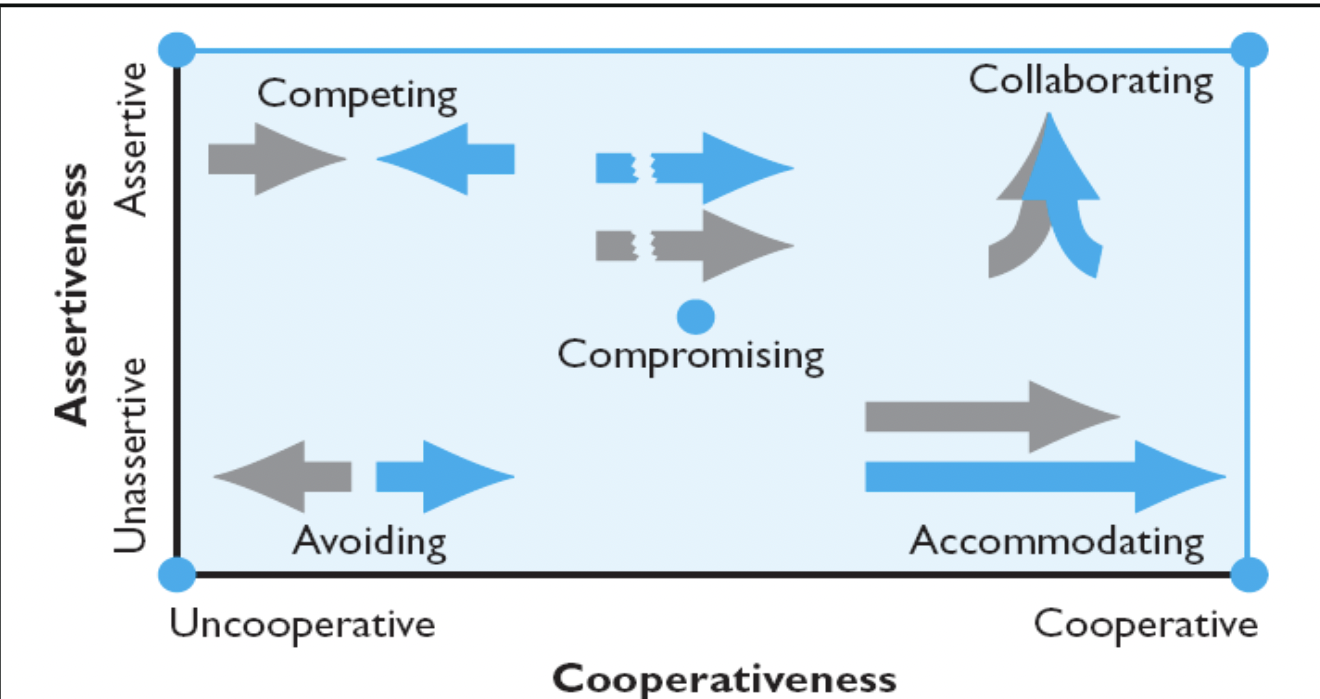-
Forming
Uncertainty about purpose, structure, and leadership
-
Storming
Intragroup conflict as members resist constraints
-
Performing
Group is cohesive with strong group identity
-
Norming
Group fully functional and working toward goals
-
Adjourning
For temporary groups: breaking up
-
Role identity
alignment of attitudes andbehavior with given role
-
Role perception
our view of how we’resupposed to act in a given situation
-
Role expectations
how others believe youshould act in a given situation
-
Role conflict
conflict experienced whenmultiple roles are incompatible
-
Norms
Acceptable standards of behavior within agroup that are shared by the group’s members
-
Deviant Workplace Behavior
Voluntarybehavior that violates significantorganizational norms and, in doing so,threatens the well-being of the organization orits members
-
Cohesiveness
The degree to which membersof the group are attracted to each other andmotivated to stay in the group
-
Effectiveness
.Accuracy – group is better than average individualbut worse than most accurate group member.Creativity – groups are better.Speed – individuals are faster
-
Efficiency
Groups are generally less efficient
-
Groupthink
A deterioration of individual’smental efficiency and moral judgments as aresult of group pressures
-
Groupshift
Groupdiscussions leadmembers to assumemore extreme positions
-
Brainstorming
Generates a list of creative alternatives whilewithholding criticism
-
Nominal Group Technique
Restricts discussion during the decision-makingprocess to encourage independent thinking
-
Task Conflict
Helps team perform better (good)
-
Interpersonal conflict
I don't like you you don't like me (bad)
-
Problem solving
solving problems
-
Self managed
everyone in charge of everyone else
-
Cross Functional
team comprised of people from different departments
-
Virtual Teams
Connected through technology
-
Traditional View
All conflict is harmful and mustbe avoided
-
Interactionist View
Conflict is encouraged to preventgroup from becoming stale
-
Managed Conflict View
Conflict is inevitable but weshould focus on productiveconflict resolution
-
Intentions

The decision to act in a given way
-
Leadership
The ability to influence a grouptoward the achievement of a vision or a set ofgoals
-
Trait theory
focuses on personal qualities andcharacteristics
-
Initiating Structure
Attempts to organizework, assign roles, andgoals (productivity
-
Consideration
Concern for followers’comfort, well-being,status, and satisfaction
-
Contingency theories
attempt to match leadershipstyle with work contextbecause one leadership styledoes not work in everysituation
-
Transformational leaders
Inspire followers to transcend their own self-interests for the good of the organization
-
Dependency
Based on the available alternatives(control) and their desirability (significance)
-
Coercive Power
Complies from fear of the negative results
-
Reward Power
Complies due to desire for positive benefits
-
Legitimate Power
From the formal authority to control and useorganizational resources
-
Expert
Influence wieldedas a result of expertise,special skill, or knowledge
-
Referent
Based onidentification with a personwho has desirable resourcesor personal traits
-
Politicking
Twisting facts to support one’sown goals and interests
-
Impression Management
The process by which individualsattempt to control the impression othersform of them

